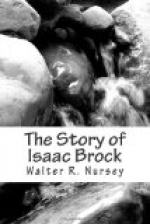Many of the settlers whom he met were from the Eastern States. These were the original Loyalists or their descendants, patriots to the core. Other more recent arrivals—perhaps two-thirds of the whole—came from Pennsylvania, New York and New Jersey, attracted by the fertility of the soil and freedom from taxation, or to escape militia service. These latter he quickly realized were not the class to rely upon in event of war, but he gave no public sign of distrust. It was from the pick of the first-mentioned stalwarts that Brock formed his loyal Canadian militia, his gallant supporters in the war of 1812, who made a reputation at Detroit and Queenston that will never die.
He was more than ever sensible of the resources of the country. This glimpse of the west enamoured him. To his “beloved brothers”—our hero always thus addressed them—he described it as a “delightful country, far exceeding anything I have seen on this continent.” The extent of the Great Lakes amazed him, as did their fish. From these deep cisterns he had seen the Indian fishermen take whitefish, the ahtikameg (deer-of-the-water), twenty pounds in weight; maskinonge— matchi-kenonje, the great pike—more than twice that size, and sturgeon that weighed two hundred pounds and over, and in such quantities that he hesitated to tell his experiences on his return.
Henry’s stories of five hundred whitefish taken with a scoop net at the rapids of Sault Ste. Marie in two hours were no longer questioned. The size of the red-fleshed land-locked trout (the quail-of-the-water), of pickerel and bass, astounded him. His travels had broadened his views. The chatter of his Iroquois and Algonquin friends was now easier of interpretation. The riddles of the wilderness were more easily read. He now realized how possible it was, in this continent of unsurveyed immensity, to journey for weeks, after leaving the white man’s domain hundreds of miles behind, and then reach only the rim of another kingdom of even far greater fertility. He also realized that beyond these laughing lands lay a rugged world of desolation, bounded in turn by the rasping ice-floes of the Arctic.
If Brock’s mind had expanded, so had his body. He was, as he expressed it, as “hard as nails.” The close of 1811 found “Master Isaac” a grand specimen of manhood. Inclined to be a little portly, he was still athletic. His face, though a trifle stern, had grown more attractive, because of the benevolent look now stamped upon it. He was still fair and florid, with a broad forehead, and eyes though somewhat small, yet full and of a grayish blue, a charming smile and splendid white teeth. Always the same kindly gentleman and always a soldier. His life at Fort George had been one of great loneliness. He read much and rapidly, and would memorize passages from the books that had left the deepest impression. History, civil and military, especially ancient authors, was his choice, and maps his weakness. Over these, with his devoted aides, he would pore late into the night, until he knew the country almost as well as his friend the Surveyor-General. For variety he feasted upon the robust beauties of Pope’s “Homer,” ever regretting he never had a master “to guide and encourage him in his tastes.”




